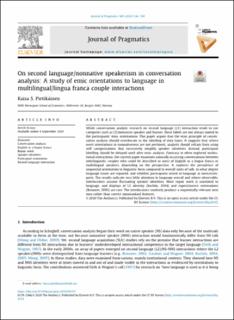| dc.contributor.author | Pietikäinen, Kaisa Sofia | |
| dc.date.accessioned | 2020-12-29T14:25:57Z | |
| dc.date.available | 2020-12-29T14:25:57Z | |
| dc.date.created | 2020-09-04T16:03:27Z | |
| dc.date.issued | 2020 | |
| dc.identifier.citation | Journal of Pragmatics. 2020, 169 136-150. | en_US |
| dc.identifier.issn | 0378-2166 | |
| dc.identifier.uri | https://hdl.handle.net/11250/2721078 | |
| dc.description.abstract | While conversation analytic research on second language (L2) interaction tends to use
categories such as L2/nonnative speaker and learner, these labels are not always rooted in
the participants' emic orientations. This paper argues that the emic principle of conversation analysis should reverberate in the labelling of data types. It suggests that where
overt orientations to nonnativeness are not pertinent, analysts should refrain from using
stiff categorizations that excessively simplify speaker identities. Instead, participant
labelling should be delayed until after emic analysis. Contrary to often explored institutional interactions, the current paper examines naturally occurring conversations between
interlinguistic couples who could be described as users of English as a lingua franca or
multilingual speakers, depending on the perspective. It explores the prevalence of
sequential orientation to linguistic form compared to overall units of talk, to what degree
language issues are repaired, and whether participants orient to language as novices/experts. The results indicate very little attention to language overall and where observable,
interlocutors assume fluctuating speaker identities. Most repair work is unrelated to
language, and displays of L2 identity (Kurhila, 2004) and expert/novice orientations
(Brouwer, 2003) are rare. The interlocutors routinely produce a sequentially relevant next
turn rather than correct nonstandard features | en_US |
| dc.language.iso | eng | en_US |
| dc.rights | Navngivelse 4.0 Internasjonal | * |
| dc.rights.uri | http://creativecommons.org/licenses/by/4.0/deed.no | * |
| dc.subject | conversation analysis | en_US |
| dc.subject | english as a lingua franca | en_US |
| dc.subject | repair work | en_US |
| dc.subject | speaker identities | en_US |
| dc.subject | participant orientation | en_US |
| dc.subject | second language interaction | en_US |
| dc.title | On second language/nonnative speakerism in conversation analysis: A study of emic orientations to language in multilingual/lingua franca couple interactions | en_US |
| dc.type | Peer reviewed | en_US |
| dc.type | Journal article | en_US |
| dc.description.version | publishedVersion | en_US |
| dc.source.pagenumber | 136-150 | en_US |
| dc.source.volume | 169 | en_US |
| dc.source.journal | Journal of Pragmatics | en_US |
| dc.identifier.doi | 10.1016/j.pragma.2020.05.017 | |
| dc.identifier.cristin | 1827468 | |
| cristin.ispublished | true | |
| cristin.fulltext | original | |
| cristin.qualitycode | 2 | |

